Search results for: “energy density”
-
Aerial Vehicles: why flying cars fly
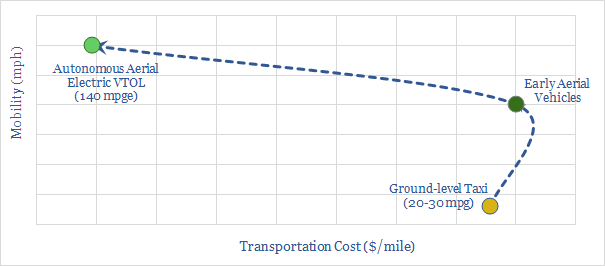
Aerial vehicles will do in the 2020s what electric vehicles did in the 2010s. They will go from a niche technology, to a global mega-trend that no forecaster can ignore. These conclusions stem from a deep-dive analysis into the technology, the fuel economies and the costs, all of which will be transformational. This 20-page written-insight…
-
Hydrogen Cars: how economic?
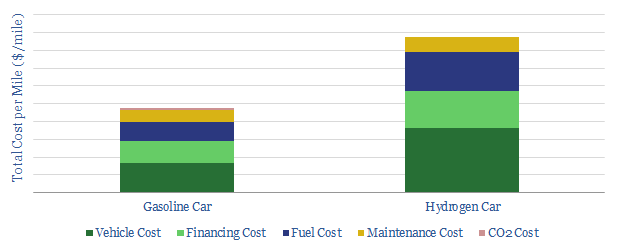
We model the relative economics of hydrogen cars, which are c85% costlier than US gasoline in our base case. In Europe, c20% cost-deflation could bring hydrogen cars close to competitiveness.
-
De-carbonising carbon?
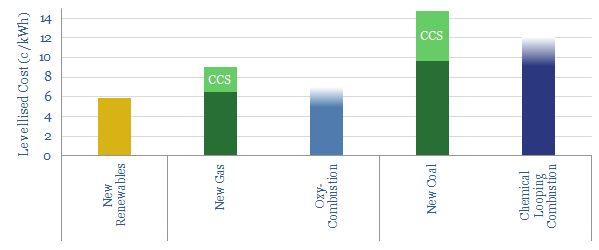
Decarbonisation is often taken to mean the end of fossil fuels. More feasible is to de-carbonise fossil fuels. This 15-page note explores two top opportunities for low-cost decarbonisation of coal and gas: ‘Oxy-Combustion’ and ‘Chemical Looping Combustion’. Leading Oil Majors support these solutions.
-
Scooter Wars?
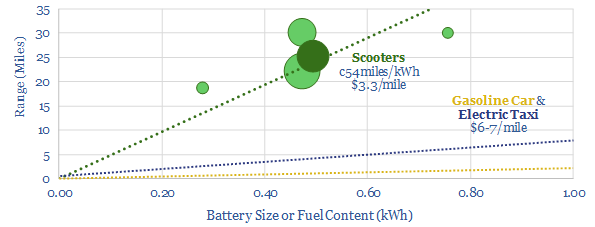
E-scooters can re-shape urban mobility, eliminating 2Mbpd of oil demand by 2030, competing amidst the ascent of “electric vehicles” and re-shaping urban economies. These implications follow from e-scooters having 25-50x higher energy efficiencies, higher convenience and c50% lower costs than gasoline vehicles, over short 1-2 mile journeys. Our 12-page note explores the consequences.
-
Oil industry CO2 per barrel?
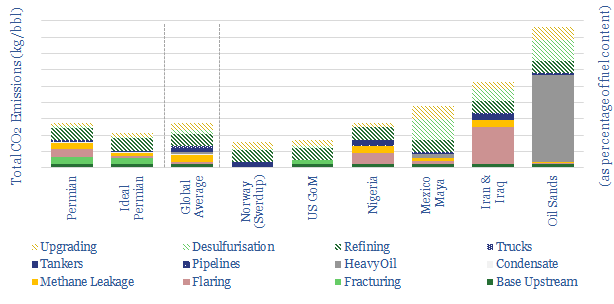
We have constructed a simple model to estimate full-cycle CO2 emissions of an oil resource, as a function of its flaring, methane leakage, gravity, sulphur content, production processes and transportation to market. A c10x energy return on energy investment is estimated. Relative advantages are seen for well-managed resources offshore and in shale; relative disadvantages are…
-
CO2 intensity of natural gas value chains?
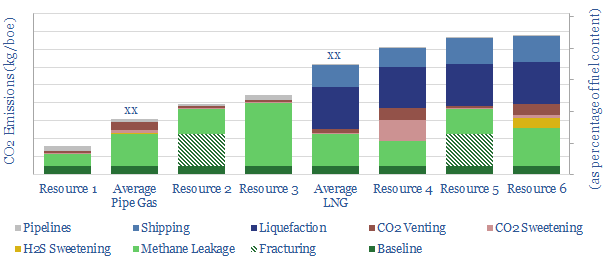
We have constructed a simple model to estimate full-cycle CO2 emissions of a gas resource, as a function of its production efficiency, contaminants (CO2 and H2S), and commercialisation (LNG or pipelines) . Compared with the life-cycle emissions of oil, CO2 per boe is seen to be c0-20% lower for LNG and c50-75% lower for piped…
-
Drones & droids: deliver us from e-commerce
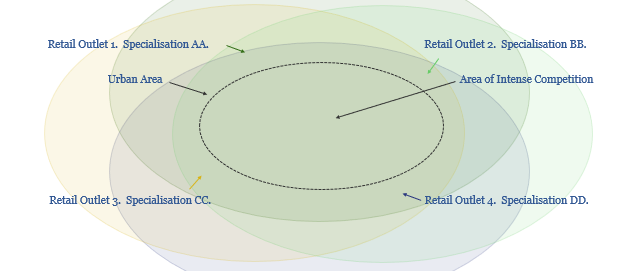
Small, autonomous, electric vehicles are emerging. They are game-changers: rapidly delivering online purchases to customers, creating vast new economic possibilities, but also driving the energy transition. Their ascent could eliminate 500MTpa of CO2, 3.5Mboed of fossil fuels and c$3trn pa of consumer spending across the OECD. The mechanism is a re-shaping of urban consumption habits,…
-
Global CO2 emissions breakdown?
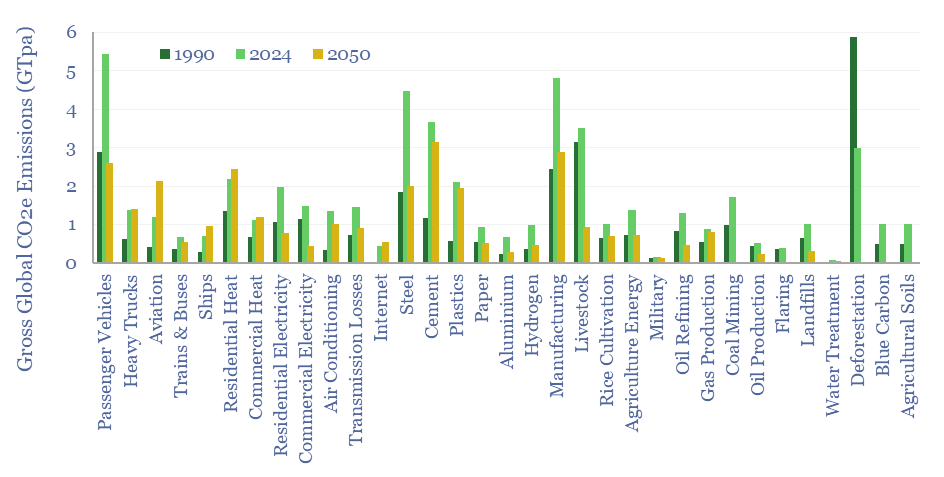
Global CO2 emissions rose from 32GTpa of CO2-equivalents in 1990 to 54GTpa in 2024, and are seen optimistically declining to 30GTpa by 2050, on a gross basis. This global CO2 emisisons breakdown covers 33 sources that each explain over 0.5% of global CO2e emissions, as a way of tracking emissions by source, by year, and…
-
Upgrading Catalysts: lower refinery temperatures and pressures?
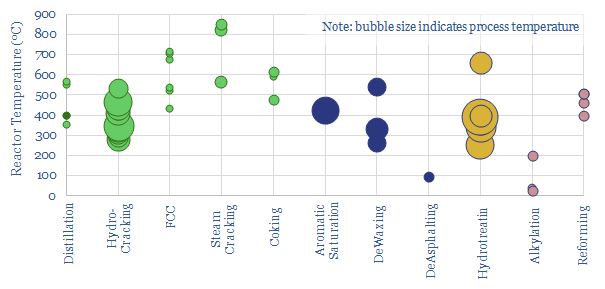
Refineries are CO2-intensive, as their average process takes place at 450C. But improved catalysts can help, based on reviewing over 50 patents from leading energy Majors, and their requisite temperatures and pressures. Combining all the best-in-class new catalysts, we think the average refinery could save 5kg/bbl of CO2 intensity.
-
Grid-scale battery costs: the economics?
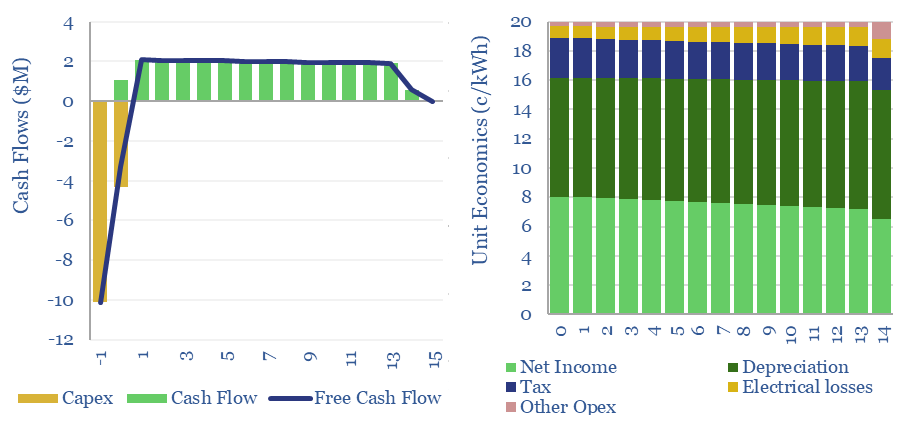
Grid-scale batteries are envisaged to store up excess renewable electricity and re-release it later. Grid-scale battery costs are modeled at 20c/kWh in our base case, which is the ‘storage spread’ that a LFP lithium ion battery must charge to earn a 10% IRR off c$1,000/kW installed capex costs. Other batteries can be compared in the…
Content by Category
- Batteries (89)
- Biofuels (44)
- Carbon Intensity (49)
- CCS (63)
- CO2 Removals (9)
- Coal (38)
- Company Diligence (95)
- Data Models (840)
- Decarbonization (160)
- Demand (110)
- Digital (60)
- Downstream (44)
- Economic Model (205)
- Energy Efficiency (75)
- Hydrogen (63)
- Industry Data (279)
- LNG (48)
- Materials (82)
- Metals (80)
- Midstream (43)
- Natural Gas (149)
- Nature (76)
- Nuclear (23)
- Oil (164)
- Patents (38)
- Plastics (44)
- Power Grids (130)
- Renewables (149)
- Screen (117)
- Semiconductors (32)
- Shale (51)
- Solar (68)
- Supply-Demand (45)
- Vehicles (90)
- Wind (44)
- Written Research (354)